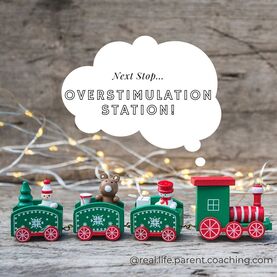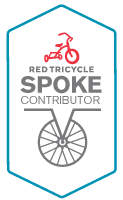Welcome to Overstimulation Station! Each December, I want my kids to experience all the magic the holiday season has to offer. And every year we hop on the figurative ‘Polar Express’ to experience a few weeks filled with magic. It’s always a great ride at the beginning; it’s exciting and filled with anticipation. But as the trip goes on and we experience one fun stop after another, without fail, we find our train stuck at Overstimulation Station! It’s a safe assumption that most of us struggle with an overwhelmed system now and then. I know that even as an adult, I tend to struggle with the excitement and keeping up with the season. When I think about the hustle and bustle, the social gatherings, and all the typical December pressures, my eyeball begins to twitch. Overstimulation can happen any time of year, but why does it seem children meltdown more than ever in December? The time of year when everything is JUST for them? Why can’t they just enjoy the ride? Well, simply stated, their little bodies just aren’t developed to handle all the stimuli we as adults ‘can’ handle — especially highly sensitive children. Let’s put on our Sensory Glasses to see how all this holiday joy takes our kids on an unwelcome trip to Overstimulation Station. Tickets, Please! During this season, kids experience new foods, new smells, new decorations, changes in routine, shopping, noisy & crowded areas. ANTICIPATION! Santa anxiety — meet with Santa, talk to Santa, take a picture with Santa, Have you been good? Will Santa come to visit me?? Why doesn’t Santa come to visit us? Holiday parties, holiday hustle, holiday music, holiday lights. Winter clothes, scratchy dressy clothes, collars, TIGHTS, hats, puffy coats. LOTS of sugar, social pressures (take a picture with Aunt so-and-so, hug Uncle so-and-so to say thank you), late nights, extended time in the car traveling, ‘pass the baby’ game so everyone gets to hold the baby...did I miss anything? I’m sure I missed something! Children thrive on routine and all things expected. December is far from that. So, what’s going on here? Kids chug along on this train ride just fine until the track suddenly switches rails and you detour to Overstimulation Station. Let’s drop some science here — The amygdala (uh-mig-duh-luh) is a small part of your brain with the purpose to quickly process and express emotions. It is located in your lower ‘reptile brain’, the part that manages reflexes like fight or flight. You can imagine the amygdala like a switch on the train tracks. If your brain processes stimuli comfortably, your train continues chugging along the track, no problem! However, if the stimuli are misinterpreted or an influx of info comes too rapidly, the reaction triggers the amygdala which quickly switches the tracks sending your brain into survival mode — insert major meltdown here. The brain is now doing whatever it can to protect itself from the unsettling stimuli. This is when you find yourself at Overstimulation Station. Once the amygdala switches the tracks, there is no quick detour out of Overstimulation Station. When our children are in this state, their brains are unable to rationalize what is happening. They typically do not have the words to express their fear or discomfort, and they do not possess the emotional regulation necessary to calm themselves down easily. One solution is to connect with your child to have them feel safe and help ease them back to a calmer state. Here are some things to consider as you’re chugging along:
We want to do all the things, have all the fun and make all the memories during the holiday season, and it’s hard to slow down the train once it starts revving up. Sometimes it feels like your train visits this station way too often around the holidays AND even during the rest of the year. In my family, once we started seeing some patterns and identifying triggers, we made some important decisions while planning events. The choices weren’t always easy, but we trusted our guts to put our child’s needs first which always made such an impact on the quality of our time together. We were finally able to enjoy holidays and events with much less stress involved. Eventually, you and your child will learn how to relax that switch. As you identify the triggers, you will be able to adjust your surroundings and help your child learn some coping strategies. Sure, you will still experience unexpected detours once in a while, but for the most part, you and your child will just enjoy the ride.
0 Comments
Leave a Reply. |
AuthorRebecca Murphy, Certified PCI® Parent Coach. CategoriesCategoriesArchives
October 2023
|
'Creating solutions for your Real Life family situations.'
©2019, Real Life Parent Coaching, LLC
Proudly powered by Weebly

 RSS Feed
RSS Feed


